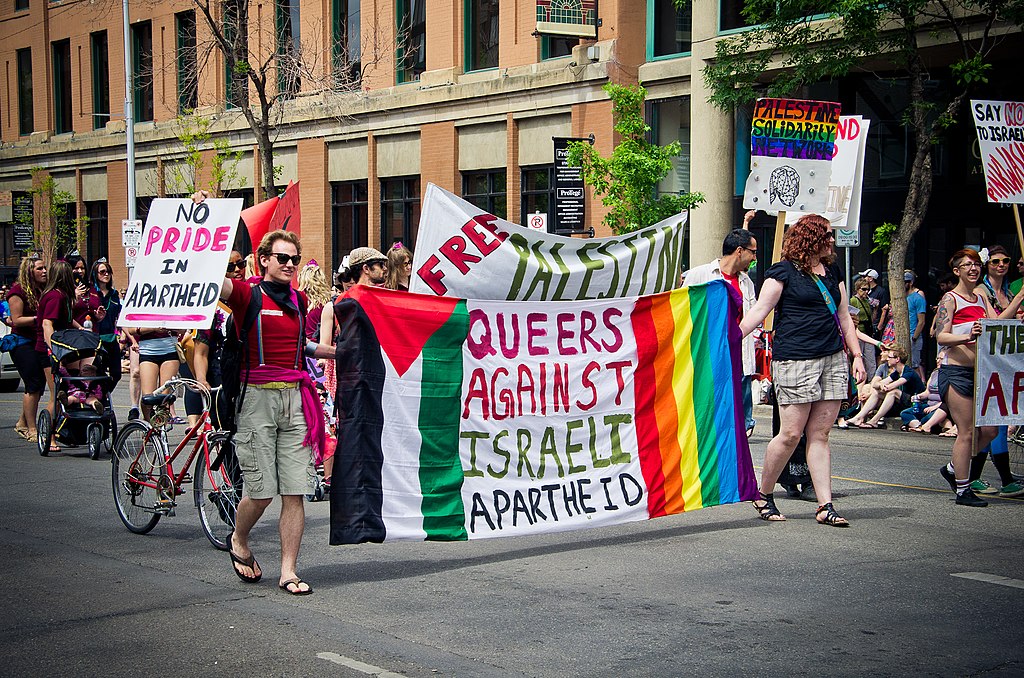In November of 2023, an Israeli soldier posted an image of himself to social media atop the rubble of destroyed Palestinian homes in Gaza, carrying a gay pride flag on which he’d written “In the Name of Love” in both English and Arabic. The phrase, he explained to Israeli news outlet Mako, was the soldier’s mocking twist on the Islamic phrase “Bismillah,” in the name of God – commonly displayed at the entrance to the Palestinian homes he’d been marauding. In his view, Israel’s genocidal assault on Gaza was finally bringing to the besieged strip its long-overdue gay rights: through the complete razing of the land and the murder of 40,000 of its people, an Israeli soldier was free to fly a pride flag in Gaza for the first time. To him, this marked progress. To many in the Palestine solidarity movement, it was a textbook example of pinkwashing.
Pinkwashing is a term used by activists to describe Israel’s cynical weaponization of a veneer of LGBTQ acceptance to distract from, and ultimately justify, its brutal oppression of Palestinians. Pinkwashing is a deliberate and well-resourced Israeli public relations strategy – one that emerged decisively out of Israeli state-sponsored firms in the early 2000s. Then, the ongoing second Intifada dominated headlines about Israel, attaching the state’s image too closely to its violent subjugation of Palestinians and their violent attempts to overthrow it. Israel’s challenge was to crush Palestinian resistance, maintain and intensify its unjust control over Palestinian lives, and somehow coax the press and public away from the colonial violence it would take to do so. For this last piece, PR firms looked to the gays.
Furnished with millions of dollars by the state, Israeli PR campaigns began as early as 2002 to actively invest in a falsified image of Israel as a “gay haven” – throwing pride events, hosting film festivals, and paying for online and print advertisements to remake Israel as a destination for young gays. “Gay Israel” was just one tactical front in a broader culture war: alongside free trips to Israel for celebrities, culture writers, and young American Jews, marketing targeted a particular class of largely white, largely wealthy gay travelers by emphasizing Israel’s military-bred men, Miami-style nightlife, and familiar Euro-American trendy cosmopolitanism. This new brand, they pitched, would capture the sympathy and support of well-meaning, LGBTQ+ friendly audiences in the West, all while enlisting them in a “culture of denial” around Israeli apartheid. Rather than countering allegations of Israel’s human rights abuses, the strategy was to get more and more people to see and champion Israel as a defender of minority rights — unwriting the struggle for Palestinian freedom from the narrative altogether.
The power of pinkwashing, then, is that it both erases and justifies Israel’s ongoing oppression of Palestinians. To its proponents, that oppression can’t coexist with Israel’s gay bars and pride parades, so it must not exist at all. But, if Israel does indeed oppress Palestinians, then its gay bars and pride parades are worth it.
Let’s be clear: this strategy works because it relies on the racist and Islamophobic assumptions embedded within its target audiences in the US and beyond. Monolithic perceptions of Arab and Muslim-majority countries as “backwards” and sexually intolerant make it possible for Israel to position itself as the liberal “antidote” to the region’s cultural failings. Pinkwashing preys on this racism, dowsing old colonial tropes about “taming the savage East” in glitter and repurposing them for the 21st century. Pinkwashing frames Israel’s colonialism in Palestine as a civilizing mission, with Israel’s relative tolerance towards LGBT+ Israelis touted as proof of its liberal values and moral superiority. Conversely, homophobia in Palestinian society becomes proof of its cultural “inferiority” – and worse, justification for its continued unfreedom.
There’s so much violence and misdirection required to keep this logic going. Pinkwashing both erases and co-opts the voices of queer Palestinians, who Israel criminalizes when they call for an end to colonialism but tokenizes to befit a narrative of Israeli tolerance they firmly reject. It markets liberal enclaves within Israel as representative of broader Israeli society, glossing over violent anti-LGBT hate crimes, religious dogmatism, and rampant homophobia, even from officials at the highest level of Israel’s government. Pinkwashing goes beyond “gay-friendly” messaging: its purpose is to establish an “us vs. them” narrative, painting over the reality of Israel’s oppression. Pinkwashing invites ordinary Americans (and beyond) to partake and revel in a highly-curated, selective misrepresentation of Israel, a place where sexual liberty reigns and Palestinians simply don’t exist – except as a shared enemy. In a pinkwashed Israel, homophobia only takes place on the other side of the wall. For that reason the wall, and all the violence it entails, is both necessary and just.
Take it from Ido Aharoni, founding chair of Israel’s “Brand Israel” PR campaign. “Brand Israel,” officially established in 2005 with a $4 million grant from the Israeli government, was tasked with revamping Israel’s brand identity. Aharoni is no longer associated with the campaign, but he illustrated its philosophy in a May 2, 2024 LinkedIn post titled “The 10-20-70 Rule: Israel’s Way to Improve its Reputation”:
“ [P]olitical support for Israel [in the U.S.] has remained relatively high, largely due to the lasting impact of 9/11… Roughly 10% oppose anything Israel… Among them are many members of the intellectual elite and, yes, many Jews. Roughly 20% report a strong emotional connection with Israel. These are Zionist Jews and Christians. The rest of the 70% are the real story. These are the uninterested and uninformed. They represent Israel’s reputational room to grow. Providing them with the opportunity to connect with Israel, is a critical mission for the country, as became so acutely evident post 10/7. People who know very little about Israel (and the little they think they know is always associated with tension, bloodshed and strife), will be more inclined to buy into a negative narrative, such as ‘Apartheid’ or ‘genocide’.”
The former Israeli Foreign serviceman continues on to advocate for Israel to establish a national “cyber-force” for propaganda, fund legal action against pro-Palestinian activists, invest in anti-DEI and pro-Israel initiatives on US campuses, and shift from marketing its soldiers to nabbing “endorsements” from trendsetters. “This is about being ‘attractive’ and ‘relevant’,” he writes. Aharoni isn’t strictly talking about the gays here, but queer people are certainly included within the valuable, vulnerable 70% that Brand Israel and other outlets for Israeli propaganda are seeking to recruit. Since October, Israel has seized upon lasting post-9/11 Islamophobia to dehumanize Palestinians and build support for its inhumane assault. But to truly gain global consent for ongoing crimes against humanity in Gaza, Israel’s goal must be to market away Palestinians entirely – their history, their injustices, their political claims, their calls to be free.
Pinkwashing relies upon racism, lies, and misdirection to conscript queer people and their supporters into playing cover for Israel’s ethnic cleansing of Palestine. As activists and organizers committed to Palestinian liberation, we have a responsibility to recognize and stand against it in our communities. What does that look like?
Center and uplift queer Palestinians in your advocacy:
Pinkwashing’s myths and narratives fall apart when you really listen to queer Palestinians. They understand the intersecting violence of zionist colonialism and homophobic patriarchy best – and they struggle for freedom from both.
The Palestinian organization Al Qaws, based in Israeli-occupied Jerusalem, advocates through grassroots activism for liberation both within Palestinian society and for it, from an anti-colonial, queer feminist frame. Join them in rejecting pinkwashing and building a world free from all structures of domination.
Call out pinkwashing when you see it:
Be clear. Pinkwashing weaponizes queer people and queer rights to keep Palestinians unfree – and that’s unacceptable. Between friends, in the workplace, and most importantly in your organizing, challenge pinkwashing wherever it emerges. When necessary, interrogate the Islamophobia and anti-Arab racism behind it.
It’s more important than ever to stand in solidarity with Palestinians and ensure that Palestinian liberation is included centrally in our calls for freedom and equality. That’s in keeping with the legacy of intersectional queer activism, which insists that none of us are free until we all are.
Reject zionism in queer spaces:
GLAAD, Human Rights Campaign, local pride organizing committees, and other supposedly progressive organizations hold sponsorships and partnerships with organizations that profit from Israel’s oppression of Palestinians. These orgs may also have direct relationships with Israeli consulates and embassies, or host and platform Israeli cultural ambassadors at their events. It is simply unacceptable for organizations that claim to advocate for queer people to lend their credibility to Israel’s project of sanitizing apartheid.
Oppose national organizations like StandWithUs and the Anti-Defamation League (ADL) that launder their opposition to Palestinian rights through a false progressive voice. Demand vocal support for Palestinian rights from the groups you organize with – including and especially from LGBTQ+ advocacy groups.
Get educated, and educate your community about the struggle for Palestinian freedom. The best way to combat efforts to pinkwash Israel’s violent occupation is to resolutely uplift the voices and demands of Palestinians.
Adhere to, and uplift, the Palestinian call to boycott:
Throughout history, from Montgomery to South Africa, ordinary people have come together to build economic power that challenges and helps overturn systems of injustice. Today, Palestinians have called upon us to participate in a global boycott movement to end Israeli apartheid. That boycott extends to Israel’s efforts at pinkwashing, from Eurovision contests to multi-million dollar gay tourism campaigns to concerts and drag queen ambassadors.
Reject the presence of companies that profit from Israel’s oppression of Palestinians at pride events. Demand LGBTQ+ rights groups break their ties with weapons manufacturers and anti-Palestinian watchdogs like the ADL. Refuse free trips to Israel and pressure public figures, including queer celebrities, not to take them. Join anti-Pinkwashing campaigns and engage in direct actions to get companies and organizations to divest from Israel’s systems of violence. It’s up to us, together, to build a world where Palestinians can be free.

